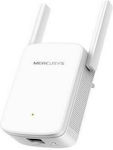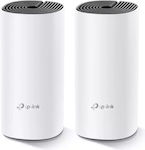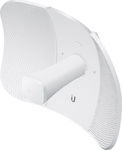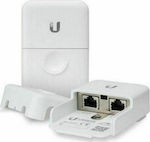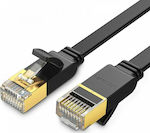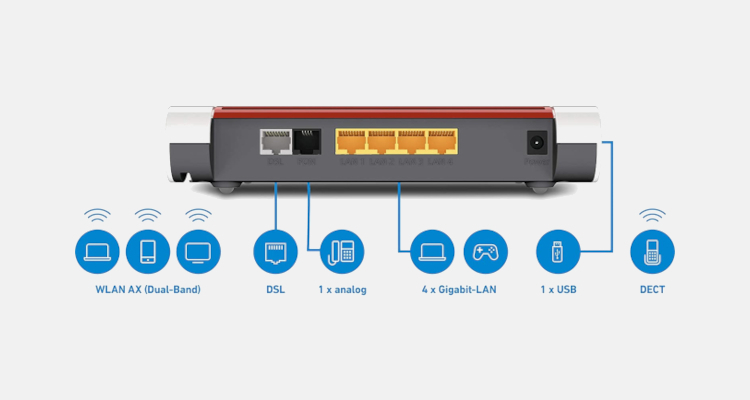User of the FritzBox 7590 for about a year, until I decided to move it to the office to meet my professional needs, so I proceeded to purchase the 7530 AX for home. I should mention that I was satisfied with the 7590 as I used it at home, but it really proved its worth when I used it at the office, as I was able to make full use of its capabilities, which were wasted in a home environment. For this reason, I decided to buy the 7530 AX (I got it for about 130 euros with some coupons I had while it was also on sale for 180 euros), considering it to be more value for money for home and it would perfectly meet my needs. And I was not disappointed...
First of all, compared to the 7590 or the 7590 AX, it is cheaper, significantly smaller in size, and has fewer ports (it does not have a separate WAN - LAN 1 port can be activated as WAN for connecting ONT to FTTH -, nor S0, it has only one telephone port instead of two, and only one USB port, which is USB 2.0). It operates silently (it does not have a fan) and I did not notice it getting hot at least from the top side. However, the bottom side is warm, not hot or anything excessive, just warm. The average power consumption is 50%, noticeably higher than the corresponding one in the 7590, which I have seen in idle mode with 8-10 wireless connections at 22-24%, proof that the 7590 is intended to handle much more volume of "work" and devices and therefore is much less strained than the 7530 AX. In general, and always compared to the 7590, I have noticed on a permanent basis higher power consumption, mainly from its WiFi and USB port (it made a particular impression on me, consistently at 40% even in idle states), without affecting its operation or causing it to heat up more.
The connection was made on a Cosmote VDSL 100 line with VoIP telephony (unlike the 7590, it does not support traditional telephony, only VoIP), where it immediately took all the settings and the internet and telephone worked normally within minutes. The FritzOS is the same and has the same settings as the 7590. The user experience is identical. The capabilities remain the same, many of which will truly remain unused in a home environment for the majority of users. The line (compared to OTE's Speedport) synchronizes 5-10% higher than the nominal speed (i.e. at 106-110 Mbps), just like with the 7590, and it is quite stable (I have not noticed sudden restarts, whereas with the Speedport I had at least 2-3 per week). In any case, it is stable and reliable, and I did not encounter any synchronization or restart issues.
The major difference from the 7590 and the main reason I chose it over the regular 7530 is the WiFi 6 (ax) [See also at the end of the text for the problems I found regarding WiFi]. The 7590 has 4 antennas (MU-MIMO) at 1733 and 800 Mbps, while the 7530 AX has, I think, 3 antennas (MU-MIMO) with a data transfer rate of 1800 Mbit/s (5 GHz - WiFi 6) and 600 Mbit/s (2.4 GHz). Having some new devices that support WiFi 6, I can say that they appear to have a "nominal" connection to the router at 1 to 1.2 Gbps (!!!), speeds that I never saw wirelessly with the 7590 (having it placed in the same spot in the house). These speeds are nominal and in no way real, but as a comparison measure they are indicative of the improved WiFi of the device. As for older devices, which transmit on WiFi 5, all I can say for sure is that they have a "better signal," even those that were further away from the location of the router in the house. And for those who were disappointed with AVM's choice to only support plain WiFi 6 and not the more recent WiFi 6E, I don't think it would have offered anything substantial to the majority of home users. Nominal wireless connections of the order of 1 Gbps cover household needs, especially when the early adoption of the newer 6E standard would not have had significant benefits in a home, considering the serious impact on power consumption, temperatures that would develop in the router, and the reduced range at the 6 GHz frequency (which penetrates walls even more difficultly). Of course, as a device, no matter how good it is, it is not aimed at gamers or other specific categories, which have specific and special requirements, especially for WiFi. Furthermore, I still use the FritzRepeater 2400 to have 5 GHz WiFi at the other end of the house, which, of course, does not support WiFi 6, only 5. However, even so, I see that the data transfer between the extender and the 7530 AX, that is, the connection of the two, is higher compared to the 7590, approaching and reaching 1 Gbps (higher compared to the 7590), which generally leads me to the conclusion that the 7530 AX is an upgrade compared to the WiFi of the 7590, at worst it is not inferior.
On the 100 Mbps line of Cosmote, whether I connect wirelessly via WiFi 6 directly to the 7530 AX or via WiFi 5 to the FritzRepeater, the speed based on the Speedtest is exactly the same (99-101 Mbps), showing that the FritzBox and FritzRepeater work very well together despite the latter's support for only WiFi 5 and without creating data congestion on the 100 Mbps line. The only problem I encountered is that when I activate the Guest Network of the house, the FritzRepeater "loses" the wireless connection for a while and then recovers. Finally, I noticed an improvement in the signal with the FritzFon C6 that I have, as in areas of the house where with the 7590 the cordless phone would warn me with an audible signal that I had moved away enough, I no longer experience similar warnings. Also, its connection with a Grandstream IP phone is flawless. It connected easily and works seamlessly even via WiFi at the other end of the house! If someone wants to deal with IP telephony, then with a FritzBox, they will have peace of mind. Moreover, it seems that IP phones will be the future, either in the workplace or in a home environment, offering more advantages and configuration parameters compared to traditional phones.
I don't have much else to say. Regarding FritzOS, whatever applies to its capabilities on the 7590 also applies here. In other words, it is overkill for a home environment and could easily be used in a small office as well. However, I consider the 7530 AX, although we are talking about an expensive modem/router, to be a more value-for-money purchase for a home, without anyone needing to pay for the premium and extra capabilities-ports of the flagship 7590. Ensures stable operation regarding the VDSL line (with options to choose between stability and performance) and telephony, substantially upgraded WiFi (though with some issues), and the power of FritzOS in terms of device configuration as a router, telephone center, NAS, media server, etc. All of this, of course, with reservations and subject to seeing it work over time, so that I can have a secure opinion, and I will come back if I discover anything new.
P.S.: For more information and a more comprehensive opinion, you can take a look at this informative review (https://www.thelab.gr/reviews/input-devices-peripherals-reviews/fritz-7530-ax-%CE%BC%CE%AF%CE%B1-%CF%89%CF%81%CE%B1%CE%AF%CE%B1-%CE%B1%CE%BD%CE%B1%CE%BD%CE%AD%CF%89%CF%83%CE%B7-r813/).
UPDATE 1-12-2023: I am reducing the stars to 4 and explaining why: From the beginning, I had occasional WiFi interruptions for a few seconds, which I attributed to the FritzRepeater 2400 not working well with the newer 7530 AX, although it had no problems with the 7590. These WiFi interruptions usually occur when I use the FritzFon (not always), when I open the Guest WiFi (always), and sometimes randomly. They are very brief interruptions, not rare but not frequent either, and ONLY in these two cases. I always noticed that the repeater had no WiFi signal while the corresponding light on the 7530 AX was still on, which led me to believe that the repeater was the issue. However, I eventually concluded that it was not the fault of the FritzRepeater (which had no problems before) but the WiFi of the 7530 AX, which actually cuts off suddenly for a few seconds despite the WLAN light remaining on!! As soon as I turned off and on the router's WiFi from the Fritzfon, everything worked perfectly. Therefore, I am reducing the stars to 4 due to the brief WiFi interruptions. I was hoping it was just a bug that would be fixed at some point in the future (given that it was not fixed with the FritzOS upgrade to 7.57), but now I don't see any solution in sight. I want to emphasize that the wireless connection is not unstable; on the contrary, I would generally describe it as quite stable without affecting my daily life. It just has some minor issues (unlike the 7590, which was rock-solid in terms of stability), and data transfer between the router and extender remains very good without any problems, as devices at one end of the house reach almost 99 Mbps internet on the 100 Mbps line according to Speedtest. By keeping the Guest WiFi permanently open, I do not experience interruptions (or at least rarely). I think it has to do with the cooperation between the repeater and the router. Apart from that, everything mentioned above still applies; I had no problems with the line and the internet (very stable, no restarts like the Speedport), and I have not encountered any other issues.





























